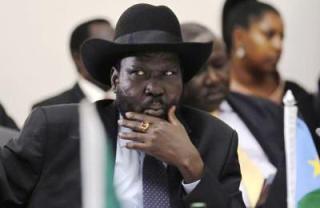S. Sudan president rejects consensus to establish cantonment areas for SPLA-IO
June 24, 2016 (JUBA) – In a serous unexpected move which is feared to fail the August 2015 peace deal signed by South Sudanese warring parties, President Salva Kiir has refused to sign resolutions of the consensus reached in the presidency three weeks ago to establish cantonment sites for the forces of the armed opposition faction of the Sudan People’s Liberation Army (SPLA-IO) under the command of his first deputy, Riek Machar.

The latest setback in the implementation of the security arrangements has been condemned by the former President of Botswana, Festus Mogae, chairman of the Joint Monitoring and Evaluation Commission (JMEC) who directly blamed President Kiir for the violation which he said threatened the collapse of the peace agreement.
President Kiir, according to a high ranking cabinet minister, has “jumped out of the consensus” and failed to sign the minutes of the three person meetings in which Vice President James Wani was the secretary while President Kiir and First Vice President, Riek Machar, engaged in mutual discussions on how to move forward with the best mechanisms to implement the peace agreement and to salvage the deteriorating economic situation in the country.
“Things are not moving. The president has decided to sleep on the minutes of the meeting in which several issues were resolved in that meeting in which he (the president), first vice president and the vice president [participated],” a senior cabinet minister told Sudan Tribune on Friday.
“He has decided to jump out of the decision of the presidency because some anti-peace elements on his side did not like it,” he added.
The minister said although the minutes of the meeting of the Presidency were taken by the Vice President, Wani, who is President Kiir’s ally, and who also conducted a joint press briefing with Machar after the meetings to confirm the resolutions, President Kiir has surprisingly refused to sign the contents of the minutes on the consensuses.
The situation has taken the parties back to square one on the issues they had reportedly agreed on earlier.
JMEC BLAMES KIIR
The head of JMEC, Festus Mogae, who is tasked by the peace agreement to oversee and monitor its full implementation, expressed disappointments in the latest developments, calling on President Kiir to honour his earlier consensus on the matters.
Mogae also revealed that at the joint meeting of the parties on Thursday, it was clear that President Kiir was responsible for the delay in the establishment of the cantonment sites in the country, saying his party was restricting the activities of the commission at the expense of peace.
“After the announcement by the Presidency that agreement had been reached on a number of issues, including the establishment of the Boundary Commission, reinstatement of civil servants, release of prisoners of war and detainees, cantonment sites, and the expanded Transitional National Legislative Assembly, I had hoped that there would be more progress,” said Mogae
“On the contrary, I regret to report that the progress I had expected has not materialized. If anything, the Parties are further apart,” he added, according to the statement he delivered before the parties on Thursday.
The former Botswana president said he has discovered from consultations with the parties that there appears to be a stalemate that threatens the implementation of the entire peace agreement.
“From my consultations with the Parties over the past two days, there is no common understanding of the terms of reference of the proposed Commission on the number of states; as well as on the issue of cantonment sites,” he said.
“It is disappointing that ceasefire monitors are facing denial of access and intimidation in different parts of South Sudan.”
President Mogae referred to limited access and freedom of movement in Juba and Yambio, where authorities have not been able to provide access to peace monitors to do their work.
“It’s a violation of peace agreement…I want the president to issue the exclusive order to the army authority to provide access and freedom of movement to CTSAM. “I said this because some of those local authorities said they will only allow CTSAM team if they receive pacific and writing from the president.”
He warned that the delay to the implementation of the peace agreement stands a chance of total economic collapse and loss of credibility of the government and decline of the local currency.
“There is a risk of total economic collapse without correcting measures to restore macroeconomic stability… and continuation of current policies would further increase inflation and accumulation of arrears causing rapid loss of credibility to the government and further decline in the value of the South Sudanese pound,” he warned.
(ST)
